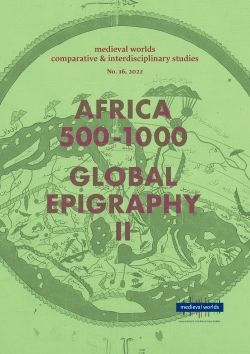Andy Merrills
S. 44 - 66
doi:
10.1553/medievalworlds_no16_2022s44
Verlag der Österreichischen Akademie der Wissenschaften
doi:
10.1553/medievalworlds_no16_2022s44
Abstract:
Corippus’ Iohannis is both the last classical epic poem to be written in Latin, and a major historical source for the early Byzantine occupation of North Africa (c. 533-551). The poem has conventionally been viewed as an uncritical celebration of the imperial occupation, thanks to its classicizing imagery and the panegyric aspects of its narrative of recent military successes. The present paper argues that this was tempered with a more critical retelling of the first fifteen years of the Byzantine occupation. This is presented in a metadiegetic analepsis (“flashback”), in the voice of an African officer in the imperial army of occupation. It is suggested that the catalogue of disasters presented here – internecine warfare, social upheaval, and plague – reflect the ambivalent attitude of contemporary Africans to the occupation itself.
Corippus, epic poetry, Byzantine Africa, narrative, Moors, Berbers
Published Online:
2022/06/30 07:42:49
Object Identifier:
0xc1aa5576 0x003d8957
Rights:All rights reserved.For questions regarding copyright and copies please contact us by email.
medieval worlds provides a forum for comparative, interdisciplinary and transcultural studies of the Middle Ages. Its aim is to overcome disciplinary boundaries, regional limits and national research traditions in Medieval Studies, to open up new spaces for discussion, and to help developing global perspectives. We focus on the period from c. 400 to 1500 CE but do not stick to rigid periodization.
medieval worlds is open to submissions of broadly comparative studies and matters of global interest, whether in single articles, companion papers, smaller clusters, or special issues on a subject of global/comparative history. We particularly invite studies of wide-ranging connectivity or comparison between different world regions.
Apart from research articles, medieval worlds publishes ongoing debates and project and conference reports on comparative medieval research.
Editorial
Ingrid Hartl and Walter Pohl
Africa 500-1000. New Perspectives for historical and archaeological research
Guest editors: Roland Steinacher, Paolo Tedesco and Philipp Margreiter
Africa 500-1000. Introduction
Roland Steinacher and Philipp Margreiter
A New Age of Saint Augustine? Antoine-Adolphe Dupuch, François Bourgade, and the
Christians of North Africa (1838-1858)
Bonnie Effros
A Subaltern’s View of Early Byzantine Africa?: Reading Corippus as History
Andy Merrills
Islamizing Berber Lifestyles
Elizabeth Fentress
The Umayyad Dynasty and the Western Maghreb. A Transregional Perspective
Isabel Toral
Maritime Trade from 3rd/9th-century Ifrīqiya: Insights from Legal Sources
Antonia Bosanquet
Africa’s Transitions to the Middle Ages
Paolo Tedesco
Global Epigraphy II. Perception and Representation of the Foreign
Guest editor: Andreas Rhoby
Introduction
Andreas Rhoby
Identification by Architectural Shape.
Sarcophagi of Indigenous People and Foreigners in Roman Imperial Lycia
Oliver Hülden
Imaginations of Barbarians and Barbarian Lands in the Latin Verse Inscriptions
Peter Kruschwitz
“Foreign(er)”, “Strange(r)” and “Extraordinary”:
xenos and its Meanings in Byzantine (Metrical) Inscriptions
Andreas Rhoby
From Genova to Yangzhou? Funerary Monuments for Europeans
in Yuan China and their Paleographic Analysis
Eva Caramello and Romedio Schmitz-Esser
Alieness in Inscriptions and Alien Inscriptions.
Alterity and Strangeness as Reflected in Pre-Modern Inscriptions from Central Europe
Andreas Zajic
Individual Article
Creolisation and Medieval Latin Europe
Bernard Gowers




 Home
Home Print
Print
 References
References
 Share
Share
